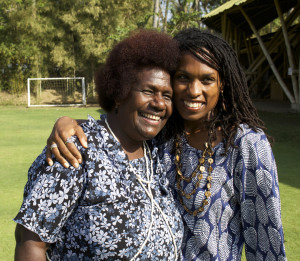By Maxine Burkett, Vice Chair of Global Greengrants’ Board of Directors

I have long been quite proud of my affiliation with the Global Greengrants Fund. This is an organization committed to providing small grants that can catalyze big acts of change in communities around the globe. This is an organization that is not afraid of activism but is very much drawn to sincere (and sometimes-life threatening) action in the face of injustice.
As a woman of color, an immigrant from Jamaica, and one committed to teasing out the meaning of right action in the face of climate change, a summit on the intersection of “Women” and “Climate” seemed somewhat obvious at first blush. Of course this conversation should happen and I would attend. Of course I would learn about the individual and community stories others would share. Of course I would be deeply moved as women (and a handful of men) convened from 37 countries, some traveling more than 40 hours to participate.
Yet, still there was so much that was unexpected. It was transformative. Serendipitous. Surprising. Enlivening.
Here are three of my most unexpected moments of awakening:
The needed bridge between “Women” and “Environment.”
It was important for these two communities of activists, advocates, and funders to convene and understand each others’ stories and struggles with the status quo.
Of course, the lines between the concepts of women’s rights and environment are often quite blurry. To realize her rights as a woman, explained one attendee, she absolutely needed access to the forest, now threatened by deforestation. There is her right to food, water, and livelihood, as well as the means to access her spiritual and cultural ground. Earth is her mother. Yet often, women’s vulnerability is discussed as a solely political and sociological matter.
The violence women experience—which we expect to increase thanks to climate-related heat—is often divorced from the environmental context in which it takes place. This environment is under increasing pressure, which will also deepen the already deep stresses on women’s access to sound livelihoods.
How in the face of this do we create women leaders and facilitate further empowerment?
There was, indeed, a gulf in understanding of the problems and possible solutions between these two funding and activist communities—one that needed bridging in order to address this fundamental question adequately. Whichever context we brought to the table, by the end, we agreed on principles we all use to inform our work and which will guide us going forward: trust, community, listening, and authenticity.
“I haven’t heard that sound in years.”
One afternoon a small group of us came upon a very striking bridge on the Green School campus. As we crossed the rambunctious river one of us from east Africa remarked, “I haven’t heard that sound in years.”
The rivers have all dried up in her community and the familiar sound of water tripping over rocks is now foreign to her.
I’ve read about, spoken of, and witnessed many instances of climate “surprises.” But I was jarred by the thought that the sound of water moving through a stream—this iconic aural representation of peace—no longer exists across vast regions of a continent. And, perhaps this is just the first of many generations of young women who will not know the sound of peace.
Smile, sing, laugh.
I’ve spent much of my career thus far pondering the right mix of mundane to novel methods for adapting to climate change. Resilience is the key word, and perhaps if we tweak x, scenario plan y, and adaptively manage z, we’ll get it just right—at least just enough. Yet, I was completely unaware (at a gut level) of core ingredients. Indeed, after days in the embrace of the Green School campus it became clear that perhaps a smile and a song are the two greatest indicators of resilience.
I spent a few short days at the Summit on Women & Climate with one of the most joy-filled women I’ve ever known. Ursula Rakova, who grew up on Papua New Guinea’s Carteret Islands, is in the process of moving her entire community from their ancestral home to a new, host community on the mainland because their island is disappearing beneath rising seas. She is attempting to lead her people, some of the world’s first to be recognized as “climate refugees,” to a new village and new livelihoods with courage and dignity.
Despite her odd and unjust predicament, Ursula smiled, laughed, and danced with the utmost sincerity and ebullience. In those moments, it occurred to me that, more than policy and planning, ultimately the community we build with joy and laughter may say much more about who survives and thrives with the coming change.
To Ursula Rakova, and the other remarkable women at the 2014 Women & Climate Summit—I am awakened and forever grateful.
